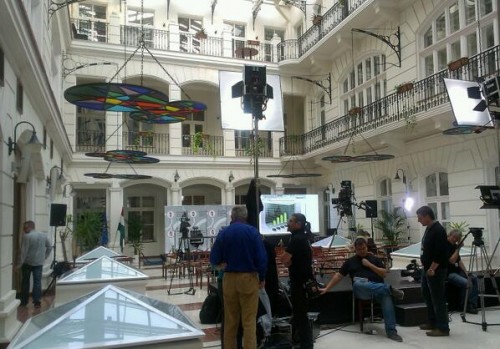11th April 2014 Budapest, Hungary
Hungary goes to the polls
The Hungarian elections have dominated our work-life over the last days and weeks. Before the elections we were visiting the parties and their candidates, talking about their plans and strategies. I went to a series of pre-election rallies round the country to feel the flavour of the campaign. Rallies organised by a range of parties, from stadium-fillers to meetings in village halls. The issues varied from international relations to complaints that the local pub had shut down. It was a fascinating experience.
As we tried to figure out the likely results, the big question before election day was how accurate the opinion polls were. I heard stories of 2002 when exit polls were ten percentage points off the actual result. So could we, should we, trust the pre-election polling? And would the new electoral system make it more difficult to predict winners and losers? In the end the results seem to have ended up pretty close to those predicted. Maybe the pollsters are among the winners from 6 April?
And then we came to election day itself. We had applied for election monitoring credentials, so we were able to visit polling stations to witness voting at first hand. The Embassy team took advantage of that and toured parts of Budapest to see what was going on. And they saw well organised, efficient systems in place. I was down-town on Sunday too, bumping into Theresa, my DHM leading a group round central polling stations and the National Election Office.

On my way home I called in on my local polling station. Unlike some of the city centre stations this one, set up in a nursery, was quite basic with toys stacked in the corners of the room and hadn’t been expecting a visit from an observer. But the team leader was very generous with his time, explaining the procedures he had to go through and showing me the safeguards in place to make sure voting was properly carried out. He reckoned an impressive 70% of eligible voters would come to the poll. In case they are readers, let me offer a big thank you to the Érmelléki utca polling station team. Of course with few staff the results of our monitoring could not be representative of what was going on around Budapest, much less round the country. But it was good to test the atmosphere a little.

I took a break on Sunday afternoon, but was out again on Sunday evening touring party headquarters and getting fresh reactions to the day from party leaders and their teams. Whether disappointed, satisfied or elated, again it was great to get that instant, genuine and very emotional reaction. Not the time to discuss long term plans, but a great insight into how political minds work.
Hungarians staying abroad on election day could vote at diplomatic representations. In London the Hungarian Embassy set up a polling station at Millbank. I haven’t heard details of how polling went, but apparently more votes were registered there than in any other foreign city. 4,435 Hungarians voted in London (82.57% of those, who had registered earlier). Which I think is a testament to the growing relationship between British and Hungarian people. It was interesting too how many Hungarian politicians visited London during the campaign period.
So now we know 98.97% of the results. By this weekend we should have the full picture (though of course appeals may happen after that). And, like all other followers of Hungarian politics and public life, we’re trying to figure out what the new government and Parliament will bring. A new chapter begins.